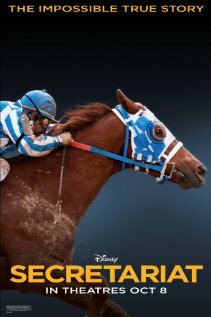I think, in the grand scheme of things, we have reached the end of what can possibly be achieved with a movie about horse racing. We have Seabiscuit for the classic underdog tale, we have Phar Lap for delving into the seedy underbelly of the business and now we have Secretariat for overcoming obstacles that have little to do with actually racing horses. Added bonus? They’re all true stories. Or at least suggested by true stories. Although, confusingly, they all end with the claim that their particular horse is considered the greatest of all time. Go figure.
What we have here is an underdog story of sorts, although one where the hurdles aren’t overcome by the horse. Instead, it’s Diane Lane (Jumper) with something to prove as Penny Chenery, a dignified housewife who is put in charge of her ailing father’s financially-troubled Stables despite knowing little about the male-dominated world of horse racing. Determined to get the family business back on the track, Penny nuts out a deal with premier horse breeder Ogden Phipps (James Cromwell; The Queen) that results in her acquisition of Secretariat, the offspring of his stallion and her mare. With the aid of renowned trainer Lucien Laurin (John Malkovich; Transformers 3), Penny raises Secretariat into a racing legend, the kind that would make for a satisfying Disney flick sometime down the line.
![2010_secretariat_017[1] 2010 secretariat 0171 e1312199161372 600x305 Secretariat (Review)](/wp-content/uploads/2010_secretariat_0171-e1312199161372-600x305.jpg)
Secretariat has been helmed by Randall Wallace, the chap responsible for directing The Man in the Iron Mask and We Were Soldiers, as well as writing Braveheart and Pearl Harbour. In other words, if you’re a stickler for historical accuracy, then this mightn’t be for you. The directing itself is assured, if unadventurous, but let’s not forget that this is a family film, so it’s better to play it safe and not confuse half of your target audience. It’s certainly formulaic at times, but Secretariat really is a case of a winning formula working, so why meddle with it?
I do feel a little sorry for the editor, however, because during the scene of Secretariat’s birth, the young colt kicks the camera mount in such a way that could not possibly have been intentional. I suspect a second take was out of the question – most mares prefer it if they don’t have to give birth to the same foal more than once – so the filmmakers probably had to make do with what footage they had. Why they kept the sound of the kick in, however, is beyond me.
Inoffensively conventional and possessing some genuinely nice moments, this really is a fine family film, but not one I suspect will stay with your children as they mature, as the best Disney films have in the past.
Alas, not every film can be The Lion King…
—





 War Horse (Review)
War Horse (Review)









